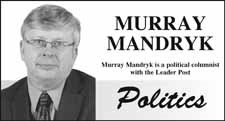The problem with our political system is voters don't have quite as much to say in who becomes their elected representative as they think.
Who runs for a party in a constituency boils down to the party nomination - a democratic process is often manipulated, interfered with by the party leadership or doesn't happen at all if the riding's party nomination isn't contested.
It can be rather easy for a political hopeful candidate to sign up friends and associates as party members in a riding and win a nomination - especially if the riding boundaries have changed.
And it's even easier for sitting politicians to control the riding executive to maintain their nominations, once they win a safe seat.
In turn, it forces politicians to adhere to the party line and is the biggest reason why we so seldom see a politicians vote against his party or switch parties.
Yet some of the best politicians we've had in history have switched from parties during their careers. In fact, the Saskatchewan Party was founded by eight individuals who switched parties because they believed it was in the best interests of those voters who actually put them in office.
On the heels of the announced retirement of Finance Minister and Canora-Pelly MLA Ken Krawetz came the news that Kelvington-Wadena MLA and Social Services Minister June Draude plans to back it in when the next provincial election is called.
Along with Krawetz, Melfort's Rod Gantefoer (who retired when the 2011 election was called) and Bob Bjornerud (who will also call it quits when the 2016 vote is held), Draude was one of four Liberals who initially formed the Saskatchewan Party.
Joined by Progressive Conservatives Ben Heppner (who has since passed on), Bill Boyd and Dan D'Autremont (who appear to be planning to run again) and Don Toth (who quietly and gracefully announced his plan not to seek re-election in Moosomin, ending what will be a 30-year career), the group made political history.
Interestingly, all survived the transition from one party to another, winning the approval of voters in what were lengthy political careers.
In the case of Draude, her career turned out to be about more than just politics. Those with disabilities who now have group homes to live in, children in distress, welfare recipients and First Nations people can all thank Draude in some way.
She likely could have fit in with most any party and enjoyed a long political career because voters respected her as much as whichever party she represented.
But all that most politicians have to do to ensure a long politic career is find a safe seat that tends to vote for one particular party. It's all about the nomination and often doesn't matter whether the individual has a relationship with the rest of the riding or not.
Consider those federal and provincial NDP politicians who, after losing in rural ridings, dramatically extended their careers by moving to safe urban seats. Dwain Lingenfelter did it twice, starting out in Shaunavon and eventually moving to Regina Elphinstone and Regina Victoria.
Like former NDP rural representatives including Lorne Nystrom, Ed Tchorzewski and Ron Harper, Lingenfelter's key to success was becoming a well-established name in his party's ranks.
In Lingenfelter's case, his 1988 nomination was shrouded in controversy over paying for memberships of Regina-Elphinstone New Democrats. And as party leader, his 2009 Regina-Victoria nomination wasn't even contested.
It is at the nomination level where our politics can be unnecessarily nasty and where it starts to become unnecessarily partisan.
As a result, we are getting fewer people like Draude who can view the world beyond the partisanship.
The odd anomaly of our democracy is that it has evolved to the point where our party representative is usually chosen for us.
It all comes down to the local party nomination.
Murray Mandryk has been covering provincial politics for over 22 years.



